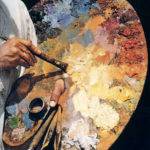Jazzism Philosophy
Jazzism is the view that the world is basically like an improvisational jazz concert writ large. The interactions of the various parts fall in and out of harmony and follow counterpoint and climax just as jazz songs do. To understand jazz music, then, is to understand life itself.
Jazzism History
Jazz music was born out of African-American culture in late 1800s New Orleans, deriving originally from ragtime and blues, but also incorporating elements of European military music. Many of the most unique elements derive from West African roots — call and response, blue notes, swing syncopation and improvisation. Over the following hundred years or so, Jazz branched out and developed many offshoots, all the while retaining a recognizable unity of form and feeling, one that is notoriously difficult to explain. As Louis Armstrong famously said “If you have to ask what Jazz is, you’ll never know.” Perhaps it could be said that this intuitive, definition-eluding aspect of Jazzism points to an inherent mysticism in the music, and by extrapolation, its underlying philosophy. Many aficionados of jazz, and practitioners of Jazzism find the same spiritual solace and search for pattern in jazz music that others find in religious practice.
Jazzism Practice
As with Rockism, Jazzists practice their religion by listening to its liturgy and attending communal services (concerts). Collecting records, discussing artists and albums with other Jazzists, and adopting the “Jazzist attitude” of cool flexibility and a penchant for the cutting-edge of experience all help the Jazzist come closer to “a love supreme” — the transcendent ideal of Jazzism.
Jazzisms
Change is always happening. That’s one of the wonderful things about jazz music.
— Maynard Ferguson
Jazz is a very democratic musical form. It comes out of a communal experience. We take our respective instruments and collectively create a thing of beauty.
— Max Roach
The spirit of jazz is the spirit of openness.
— Herbie Hancock
Jazz is smooth and cool. Jazz is rage. Jazz flows like water. Jazz never seems to begin or end. Jazz isn’t methodical, but jazz isn’t messy either. Jazz is a conversation, a give and take. Jazz is the connection and communication between musicians. Jazz is abandon.
— Nat Wolff
Jazzism Community
Get ordained as a Jazzist Minister










